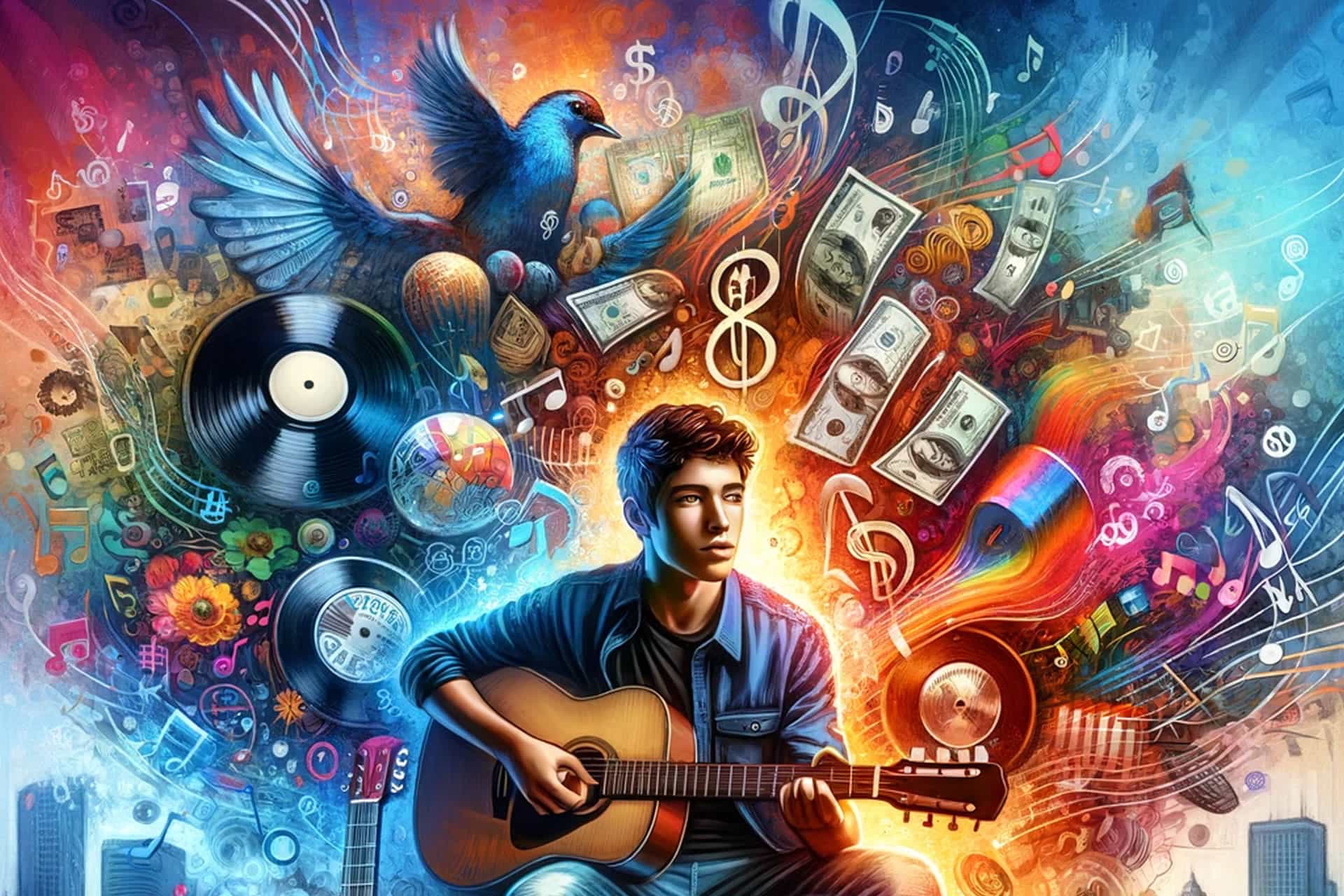The dream of making a living off of one’s music is as old as the music industry itself. In today’s digital age, the avenues for monetizing music have diversified, offering musicians more opportunities than ever before. This comprehensive guide explores various strategies for making money with music, catering to artists, songwriters, and producers alike.
Table of Contents
Understanding the Music Industry Landscape
Before diving into specific money-making methods, it’s essential to understand the current landscape of the music industry. The digital revolution has transformed how music is consumed, distributed, and monetized. While traditional revenue streams like album sales and live performances still hold value, digital platforms, streaming, and online content have opened up new avenues for revenue generation.
Streaming Revenue
Streaming platforms like Spotify, Apple Music, and Amazon Music have become primary music consumption sources. Here’s how to tap into streaming revenue:
Distribute Your Music on Streaming Platforms
- Use digital distribution services like DistroKid, TuneCore, or CD Baby to get your music on major streaming platforms.
- These services handle the distribution for a fee or a cut of your royalties.
Maximize Your Streaming Royalties
- Register with a Performing Rights Organization (PRO) to collect performance royalties.
- Sign up with SoundExchange for digital performance royalties from non-interactive streaming services.
Live Performances
Live performances remain a significant revenue source for musicians. Whether it’s local gigs, tours, or live-streamed concerts, performing live can be lucrative.
Gigging
- Start by playing local venues to build a following.
- Network with other artists and promoters to find more gig opportunities.
- Consider using platforms like GigSalad or Sonicbids to find and book shows.
Touring
- Once you have a substantial following, plan a tour.
- Collaborate with booking agents and venues, and promote your tour through social media and music press.
Live Streaming
- Platforms like Twitch, YouTube Live, and Facebook Live allow you to perform virtually and monetize your performance through ads, subscriptions, or donations.
Selling Music and Merchandise
Digital Sales
- In addition to streaming, selling digital downloads of your music through platforms like Bandcamp or iTunes can provide direct revenue.
Physical Merchandise
- Selling physical merchandise like vinyl, CDs, T-shirts, and posters can be a significant income source.
- Use services like Printful or Merchbar to create and sell merchandise.
Licensing and Sync Deals
Licensing your music for use in TV, films, advertisements, and video games is another lucrative income stream.
Sync Licensing
- Create a portfolio of your music suitable for various media.
- Network with music supervisors, ad agencies, and gaming companies, or use platforms like Musicbed or Songtradr to license your music.
Royalty-Free Music Libraries
- You can also create music for royalty-free libraries like AudioJungle or Pond5, where content creators can purchase the rights to use your music.
Teaching and Workshops
If you have a particular skill or expertise, teaching music can be a rewarding and steady income source.
Private Lessons
- Offer private lessons, either in person or online via platforms like Zoom or Skype.
- Use social media and music teaching websites to advertise your services.
Online Courses and Workshops
- Create and sell online courses or conduct workshops on platforms like Udemy or Teachable.
Crowdfunding and Patronage
Platforms like Patreon or Kickstarter allow fans to financially support your projects in exchange for exclusive content or experiences.
Crowdfunding Campaigns
- Launch a crowdfunding campaign for a specific project, like an album or tour.
- Offer exclusive rewards to backers, such as early access to music, exclusive merchandise, or personal experiences.
Ongoing Patronage
- Set up a Patreon page where fans can support you monthly in exchange for exclusive content, behind-the-scenes access, or other perks.
YouTube and Content Creation
YouTube offers multiple ways to earn money, including ad revenue, sponsored content, and fan donations.
Monetize Your YouTube Channel
- Create a YouTube channel to share music videos, behind-the-scenes content, or educational videos.
- Once you meet YouTube’s monetization criteria, you can earn ad revenue.
Sponsored Content
- Collaborate with brands for sponsored content once you have a substantial following.
Collaborations and Session Work
Working with other artists as a collaborator or session musician can open up new revenue streams.
Collaborations
- Collaborate with other artists on tracks, performances, or writing sessions.
Session Work
- Offer your skills as a session musician for recordings or live performances.
Music Writing and Production
If you’re skilled in songwriting or production, these skills can be monetized.
Songwriting for Others
- Write songs for other artists, or sell your songs to music libraries.
Producing for Other Artists
- Offer your services as a producer or engineer to other musicians or bands.
Ghost Production
- Produce tracks for other artists anonymously, a common practice in genres like EDM.
Grants and Funding
Numerous organizations offer grants and funding opportunities to support musicians and their projects.
Research and Apply for Grants
- Look for music grants offered by arts councils, governments, and private organizations.
- Tailor your proposals to meet the grant criteria and showcase the uniqueness of your project.
Artist Residencies
- Artist residencies not only provide financial support but also give you space and time to focus on your music.
Podcasts and Interviews
Participating in podcasts or interviews can help in promoting your music and can sometimes offer financial benefits.
Guest Appearances
- Appear as a guest on music-related podcasts or radio shows.
- Some podcasts offer payment or allow you to promote your merchandise or tours.
Email Marketing
Building a strong email list can be a powerful tool for direct marketing and sales.
Direct-to-Fan Marketing
- Use email marketing to sell your music, tickets, and merchandise directly to your fans.
Regular Updates and Exclusive Offers
- Keep your fans engaged with regular updates and exclusive offers via email.
Music Competitions and Awards
Participating in music competitions or awards can offer cash prizes and significant exposure.
Enter Competitions
- Research and enter relevant music competitions. Even if you don’t win, the exposure can be beneficial.
Social Media Monetization
Platforms like Instagram, TikTok, and Facebook offer various monetization options, including sponsored posts and branded content.
Engage with Your Audience
- Regularly post engaging content and interact with your followers.
- Collaborate with brands for sponsored content once you have a significant following.
Fan-Funded Music Videos
Crowdfund your music videos by involving your fans in the creative process.
Involve Your Audience
- Use platforms like Kickstarter to fund music videos, offering fans a chance to be part of the process through rewards and exclusive content.
Maximizing Your Music Revenue: Key Takeaways
- Diversify Your Income Streams: Don’t rely on a single source of income. Explore various avenues to maximize your earnings.
- Engage with Your Audience: Build a strong relationship with your fans. Engaged fans are more likely to support your music financially.
- Leverage Digital Platforms: Utilize digital platforms and social media effectively for promotion and revenue generation.
- Stay Informed and Adaptable: The music industry is constantly evolving. Stay informed about new trends and be adaptable to changes.
- Invest in Your Craft: Continuously improve your skills and the quality of your music. High-quality work stands out and attracts more opportunities.
Conclusion
The path to making money with music is multifaceted and requires a combination of talent, business acumen, and strategic planning. By leveraging the various revenue streams available and engaging effectively with your audience, you can turn your passion for music into a sustainable career. Remember, success in the music industry is not just about great music; it’s about how smartly you navigate its business aspects and seize the opportunities that come your way.








